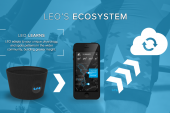
Welcome to the start of a new series. We’re continually amazed at how vibrant and innovative Toronto’s startup community is, but, instead of focusing on its companies, we’ve chosen to shine a light on individuals that make the community possible. We start the series with Ryan Tyler Thomas. Anyone that has even a passing connection with Toronto’s startups has likely heard of him. In fact, it’s difficult not to, as Ryan is certainly one of the most charismatic individuals I’ve ever met. Here, he talks about his experiences as an entrepreneur, the shape of entrepreneurship to come, and some advice for those looking to make the plunge.
When we first met, you introduced yourself by telling me you’re an art school dropout. Want to tell us how that person started the Longest Pour (a private bartending company)?
Actually, I started the Longest Pour at the end of high school. The idea behind it was that I was working at a bar at the time, and the only way to get a raise while working in that industry is to quit and go work at a bar where the tips are higher. It’s a lot like writing, and it gives you this weird sense of owning your own work. You own your bar when it’s your shift; you own your section when you’re a writer. Once you get used to the concept, you start to realize that the money you make is tied to the effort you put in. So I thought, why would I work for anybody else? Let me cut out all the overhead and make more than $5.50 an hour and maybe I can get rich. Doing that I quickly learned this incredibly important lesson. Imagine you have to bring an entire wet bar to somebody and have to take care of any staffing beyond yourself. Well, you start to do the math and it quickly turns out that running a private bartending company is way more expensive than you ever thought it would be. Suddenly, this big check that seemed huge, when you start to parse it all out, starts to get smaller and smaller. Mathematically it wasn’t a sustainable enterprise for a nineteen-year-old.
I had never taken a proper business course; my dream wasn’t Schulich and then working at a big office downtown.
The dream was to create art for a living, right?
That was someone telling me that you had to do something with your life.
I assume that’s something everyone told you?
Oh, yeah… though mostly it was a high school girlfriend telling me, “Ryan, you can’t play football and be a bartender for the rest of your life,” which was a good piece of advice, especially when I stopped growing. I got accidentally enrolled in a OAC art class. Prior to that, I had never thought about art–I had done design and worked on the yearbook, but I had never done art-art. So I said, “What the hell–why not?”
Okay, but how did you get “accidentally enrolled” in the class?
I had to fill in a course and I forgot to, so I guess somebody penciled me in. I showed up to this class, which was a terrifying experience. But it turned out that I was very good at it and I ended up getting A’s, so I decided that maybe a creatively-driven career was something that was for me.
You show up at art school, and it’s this thing. There’s no money in art that you don’t make for yourself. So it’s the second time in my life where I’m confronted with this idea that the hustle you put into something is the money you get out of it. You look at great artists like Damien Hirst and Banksy, and they all know how to market themselves, or even look at artists from Toronto: Al Runt (the painter of the Lee’s Palace mural) has been hustling for 25-plus years. So, I spent two-and-a-half years building a skill set, but I quickly realized that while skill set is important, if you don’t know how to market your skills, then you’re the biggest waste of talent anyone has ever seen.
This was something that was heart breaking to me.
I’m a social person. I realize making it comes down to what you can sell, how well you communicate it, and whether there’s genuine need for what you’re selling. So I dropped out. I didn’t see the need to put any more money into schooling myself. I figured I could hustle on my own and so I did.
After I dropped out, I did some bartending and scheming on the side, and I figured there was a way I could make everything work. It turns out that everything needs great marketers and communicators to succeed. So I decided to go back to school. I figured I could get this if I went into advertising.
That said, this thing that I had learned haunted me: that is, the amount of work you put into something is the pay you get out of it–and why should anyone else own my work? So I went to school again, I rushed through an advertising program. I thought I was going to graduate, become a copywriter in advertising, and write great words. After an initial internship I got my first job and I was a grownup finally…
How old were you when you became a “grownup”?
Oh, this is dark… let’s see… I would have been 26 at that point. Anyway, I had this dream that I was going to be on the “30 Under 30” for Marketing Magazine, and that I was going to be this hot commodity in advertising. Well, I got my first job. It was with this company called Smak that does ambient and guerrilla advertising, so stuff that’s not billboards. My title became “Concept Developer,” and within six months, I realized that there was nothing stopping me from being a person that could one day own their own agency. I then found out that the owners of Smak were 27… they were me! They started out of Vancouver with this crazy idea that no one had cornered a section of the market, and so they became Canada’s leading ambient and guerrilla marketing agency.
I roped in a couple of friends who were searching for jobs and had come to the dramatic realization that this huge corporate structure existed where no seemed to be in their 30s and everyone was either 24 or 55–I don’t know where the 30 year olds are, but I’d love to meet them.
We said, screw it, and decided to start our own company, which we ended up calling Switch. The company I was working for at the time wasn’t dealing with a thing we thought that they had missed, which was that smartphones were starting to explode. As an advertising company that was doing things on the street level, they weren’t integrating any kind of digital component into their work. I thought if I could make a company that did what they did and also had a strong digital component, then I would be golden. I thought I could be a part of Canada’s leading digital advertising agency.
So you get excited and you write, “Lead Business Strategist” on the business card that you designed yourself–they were adorable business cards–and we ended up running the agency for a year-and-a-half. It was three guys on Skype–we used to leave Skype open so that we could hear each other typing, it made it feel like we were in a office together. That was it: three guys and cheap coffee, and we made it work. Everyone got paid and we were doing well, but it was just a case of we hadn’t really nailed that digital component, and that was something that bothered me, so when it looked like we might be able to keep going and be sustainable on a small level, I decided to leave. I still had big dreams, and that’s how I ended up at Playground.
What brought you to Playground specifically?
I was on a parallel path with Ryan Bannon, who was someone I had gone to school with. He co-founded Playground, and I think his reasons for starting the company were the same ones I had when I started Switch with my friends: he saw people in traditional advertising mishandling the digital component of their work, and thought, rightly so, that he could do a better job of it. About a year and a half in, I had my first conversation with him and the rest of the company, and I got asked, “How come we do more work than you, but no one ever talks about us?” He and I had this huge conversation about why people talked about my company’s work, and at the end of our conversation, I handed him two pages of notes. On the end of the second page, I wrote, Hire me, as there was just too much stuff for me to to explain to him in small amount of time.
Ryan’s an incredible creative–but public relations? He didn’t care about PR. So as a friend I gave him the best I could, but then when it became too much advice I jokingly told him to hire; the next thing I know, I was a partner at Playground.
When I met you almost a year ago, you were working at Playground and seemed really happy there. What made you decide to leave?
In the entrepreneurial world, nothing is simpler than packing up, leaving, and starting a new project. At Playground, I had had a job with a very clear role, but we grew so fast that our ability to take on new work started to back up. My job went from saying, “How can we help” to “I’m sorry, we can’t take your business.” Moreover, since Playground launched, the market had dramatically changed. Everyone likes to think that the ideal is to bring in internally the services that an agency like Playground provides, but Ryan and I liked to joke that people that had made the company special were something we called peak people. That is, individuals that are genuinely talented and have the skill set needed to build a platform. Unfortunately, these people are getting harder and harder to find and, at the same time, there is a lot greater demand for them.
And because you can only have so many of these individuals on your team at any one time, it also means that there’s only so many clients you can take on and only so many projects you can share and talk about. So, my job quickly went from finding great people and companies for us to work with, and being this social voice for the company, to apologizing to those same people that we couldn’t take on the job they had for us.
For me, if you’re not moving forward, you’re moving backwards. As a company we couldn’t push fast enough, nor did we want to, because it would have meant lowering the morale of the staff, the quality of their work, and negatively impacting health. Still, I became restless, so I decided to take the show on the road.
Okay, so do you want to talk about what you’re doing now?
What really fascinates me is not so much watching a client come on board–which is obviously exciting for an agency and great for its growth–but when a client comes in and says that that they have a problem they can’t fix and being able to say, “Oh, well there’s a really simple solution to that problem.” I think what I’ve learned is that engineers make everybody’s lives easier, and that their goal isn’t to build something hugely complex and archaic. Instead, they want to create something you can interact with it. For instance, the Toronto Standard without writers is a framework that no one cares about.
I’d like to think so…
It’s true! Content is this big new war. People are looking for great stories, to be entertained, and for amazing and engaging experiences. Great developers build these great platforms that the rest of us use. There’s also this new kind of entrepreneur, and we’ve seen them across a lot of small categories, that take advantage of what others have built for them to deliver great products and experiences. And I think as more and more developers become entrepreneurial, the cost of trying something new is going to continue to become smaller and smaller.
Have you heard about Shoplocket?
Yeah, we share our workspace with them.
Shoplocket, as a company, has allowed a whole new group of entrepreneurs who aren’t technical to create online markets for their products; I think they’re a just a small taste of what you’re going to see in the near future. With all these companies popping up, it’s not about the million dollars of development work by a committed team. Instead, it’s about opportunities a talented group of engineers have created for you to be special. For example, that’s the reason journalism has become what it is. Anyone can be a publisher now, and they can own their own platform and social media footprint. That’s what is happening in the entrepreneurial world right now, and what I’m doing now is consulting a bunch of small companies on how to leverage those resources. The ones that engineers built for them.
Your about.me page lists three simple rules–Be Social, Be Digital, Be Newsworthy. Do you want to expand on those?
Those rules were the reason I started my first company. When we coined them at Switch, they were things we wanted to learn, things that I think traditional marketing wasn’t doing right, and things that most people hadn’t capitalized on. Being social comes down to this simple fact: if you’re social and make connections, people will want to help and hear about what you’re doing. They will also get excited about what you’re doing.
Being digital is about lowering costs. There’s an amazing documentary out right now called Searching for Sugarman. It’s about this singer, Rodriguez, that had no idea he was popular in 1970s in South Africa. It took him thirty years to find that out. That’s never going to happen again. The digital world exists in such a way that no one could find themselves in the same scenario. At the same time, I don’t think people have taken enough advantage of the digital world. As a company, you might discover that there’s a market you had no idea about, so be digital. Consider the ramifications of having a digital footprint, what it means to you, and what it takes to get there.
Be newsworthy is just that. The best thing any organization can do is to continually keep one-upping themselves and communicating that to their customers. Ask yourself: What are we doing that is worth talking about? Because if you do one great thing, and you have a really great customer base, then those customers are going to talk about you to their friends. One customers tells two of their friends about your company, and then those two friends tell two more friends. So it’s worth thinking about whether your work matters to the rest of the world.
I recently had a client ask me, “Oh, it’s not digital, but we’ve created this simple solution that helps illiterate communities track infant births, and so far it has helped save 63 babies in a small community in Ghana.” They asked me if that was a project that was worth talking about. I said, “Are you insane? Of course that’s worth talking about.” 63 births that would have never been in a small community is probably the best thing you could do. It’s a real and meaningful success. What does that look like when you move that project to any other improvised community? What does it look like when you move to Detroit? What if a few small changes to the project leads to a change in how we operate our health care lineups in Canada?
Creating something newsworthy means creating something that people can invest in on a emotional and intellectual level, and not just a financial level… and I think that’s incredibly important.
If you do those three things, you will be fine. Those are my three KPIs–key performance indicators– and if you answer yes, yes, and yes to those three points, then I think you will find that you’re in a really good place.
Going forward, what’s next for you? I know there’s a lot of stuff you can’t talk about yet, but maybe tease us a bit.
I’ve got two [projects] on the horizon that I’m really excited about. One is an amazing bottled beverage possibility. If I manage to bottle a product and get it onto a store shelf, it will be a whole other thing I never thought I would have done in my life.
The other is again working to create better digital products. That seems to be something everybody needs, and that one I’ll hopefully be able to talk about really soon.
Is there a local entrepreneur you would like to see profiled on the Toronto Standard? Email Igor Bonifacic at igorbonifacic [at] gmail [dotcom] with suggestions.
____
Igor Bonifacic is a writer working for the Toronto Standard. You can follow him on twitter @igorbonifacic.
For more, follow us on Twitter @TorontoStandard and subscribe to our newsletter.














